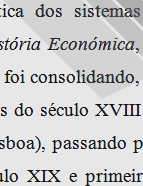

................................
However, as an assemblyman (serving in several legislatures and being an active supporter of the Estado Novo), he made a speech in the National Assembly on March 12, 1947, which has been noted for his interest in and knowledge of the progress of the discipline in other countries (João Paulo Nunes, A História Económica..., pp. 79-80). He criticised how history was being taught, asserting that it was the State's responsibility to establish an irrefutable foundation for the discipline, "so that myths do not obscure the truth, singular and isolated conceptions do not distort objectivity, and improvisation does not defeat study and reflection." He proposed the research and teaching of: "A plebeian and less elegant, mundane and quotidian history that depicts and enlightens us about the real, living, dynamic man, with an almost universal psychology, but grounded to the land or leaning on his ship, circulating, labouring, the obscure combatant of natural disfavour." Following this, an overview is provided of the advancements in economic history within universities across various countries (including Harvard, Cambridge, German universities, and the publication of the "Economic History of England" by Lipson [Ephraim Lipson, 1888-1960]). Subsequently, a proposal for the establishment of "a university research seminar [in economic history], a study centre, a discipline, and above all broad experience" is advanced. Despite hesitancy regarding the university where this centre should be created, Coimbra was eventually suggested, albeit cautiously: "I am too fond of Lisbon and admire Porto excessively to be labelled a 'Coimbrão.' However, there is a tranquil and meditative atmosphere in our Heidelberg, which not only invites verse..." (Diário das Sessões da Assembleia Nacional, 1947, pp. 810-812). This initiative was praised and acknowledged by the Senate of the University of Coimbra during the session of March 17, 1947 (João Paulo Nunes, Idem, 1995, p. 80). Another initiative was implemented at the Faculty of Letters of the University of Coimbra around the same time (academic year 1946-1947). It involved the teaching of a course entitled "Introduction to General Economic History" by the Belgian historian Charles Verlinden (1907-1996), an expert in economic history. This event was promoted by the Institute of Historical Studies of the above-mentioned Faculty (with the sponsorship of the Institute for High Culture), through the medievalist historian Torquato de Sousa Soares (1903-1988).
